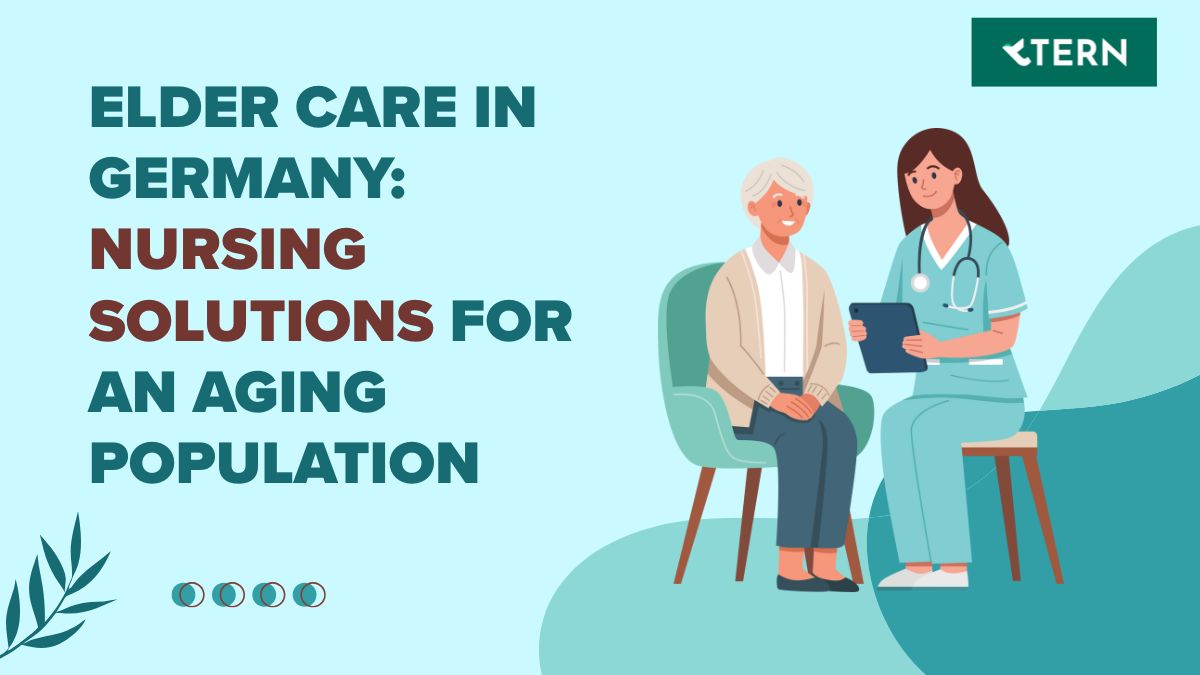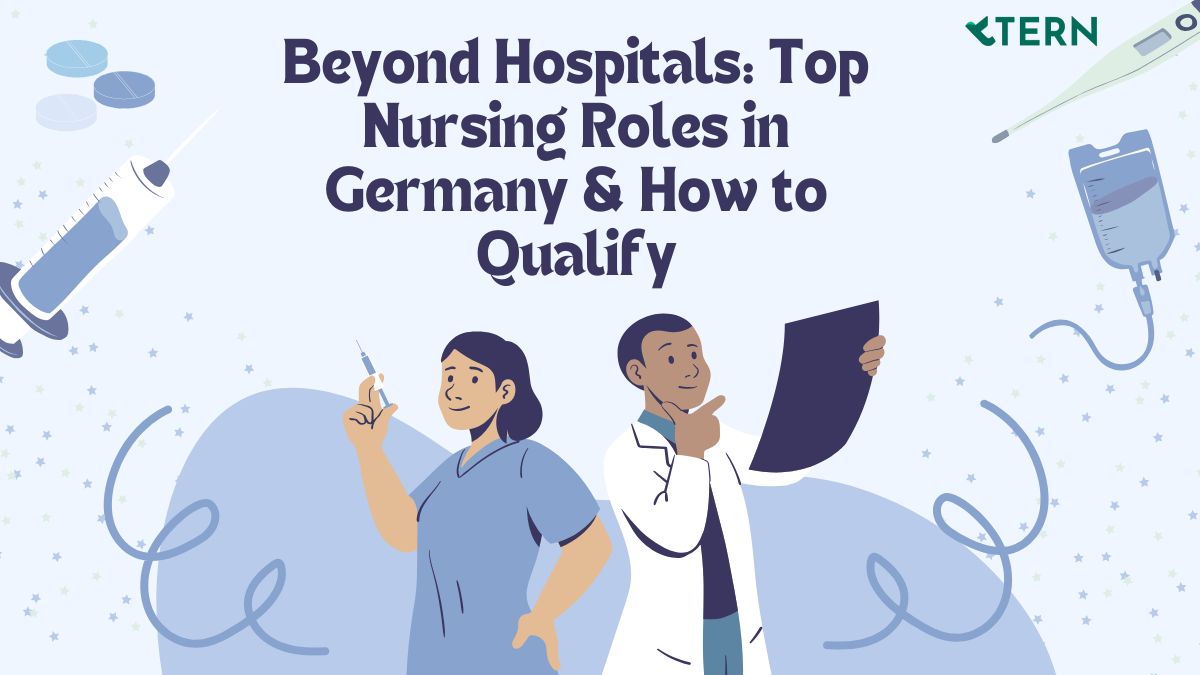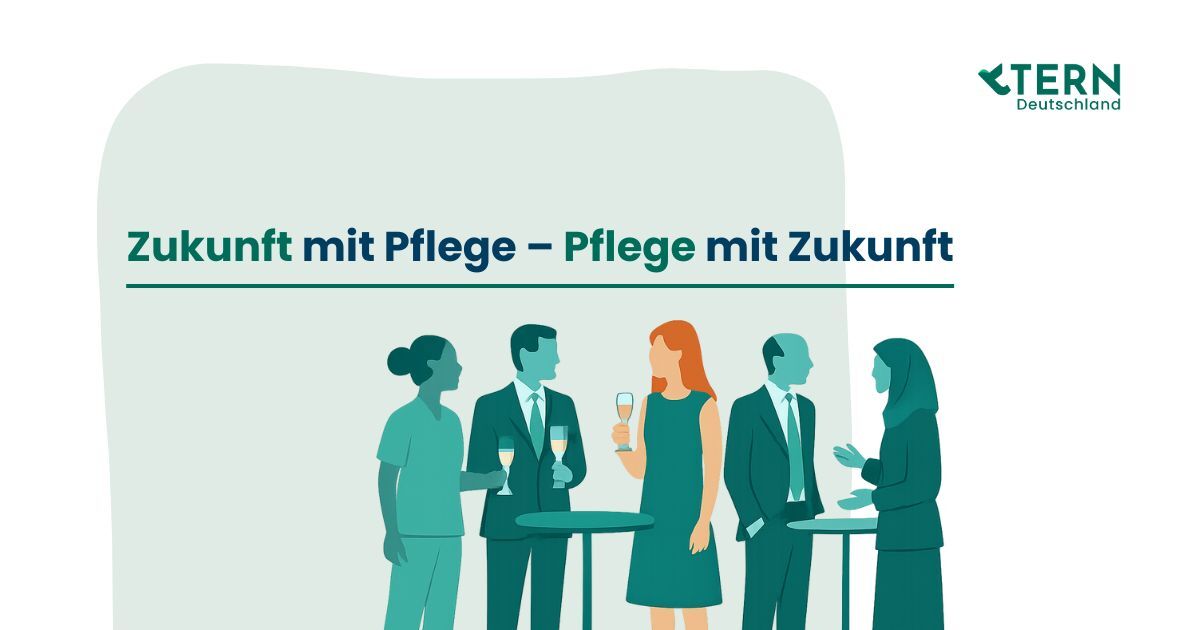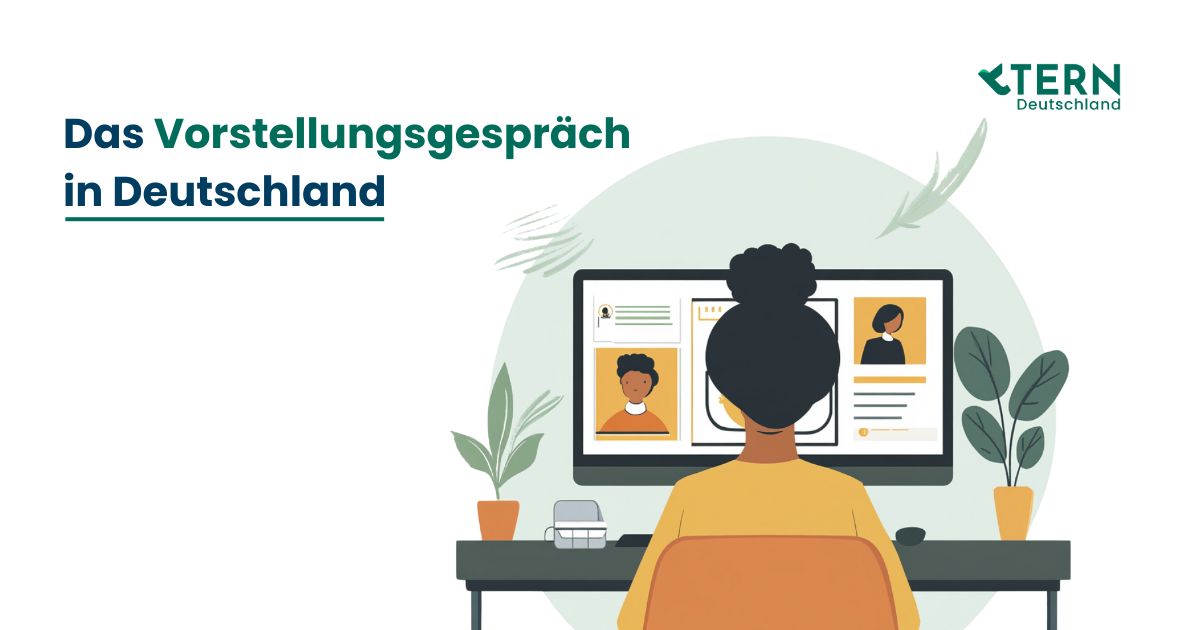Nursing in Germany
May 15, 2024
•
11 Min Read
German Language Proficiency: A Requirement for International Nurses to Practise in Germany

Have you ever dreamt of pushing your boundaries and making a global impact with your nursing skills? With over 37,000 open nursing positions, Germany's world-class healthcare system offers a chance to do just that. Imagine working alongside leading professionals, receiving competitive salaries, and enjoying a healthy work-life balance. Yet, embarking on this rewarding journey requires more than just nursing experience. You need to learn fluent German in addition to academic qualifications and medical fitness.
This blog will provide all the information on German language proficiency for pursuing nursing.
What is the process of becoming a nurse in Germany?
The process of becoming a nurse in Germany involves the following steps:
- Educational qualifications: You must hold a Bachelor of Science in Nursing or equivalent from a recognised institution.
- Language proficiency: You need a German language proficiency of B1 or B2 level, as per the CERF language scale.
- Document evaluation: All the required documents need to be sent to the German Embassy to evaluate the equivalence to the country’s standards.
- Recognition procedure: The next step is the recognition process where you send your documents and qualifications to the respective state nursing council.
- Adaptation course: Depending on the answer received during the recognition procedure, you might need to take an adaptation course or knowledge exam.
After the adaptation course, you can start looking for jobs, interviewing and receiving an offer. You can then apply for a work visa at the German Embassy, relocate and begin your nursing career in Germany.

Why is it important for nurses to learn German?
Even though German language proficiency is mandated by the government, knowing the language can help you. In Germany, the majority of the population speaks German. Since communication is a key aspect of working in the healthcare sector, knowing the language is crucial.
You will need to be able to speak and understand German fluently to communicate with the patients about their concerns and symptoms and relay them to your colleagues for an informed diagnosis. Without having a nuanced understanding of the language, it could result in wrong medications or misdiagnosis that can ultimately affect the patient’s safety.
Lastly, knowing the language will aid you in integrating better into the community by helping you build relations and trust with those around you.
What level of language competency do I need to become a nurse in Germany?
To work as a nurse in Germany, you'll typically need a B1 (Threshold) or B2 (Vantage) level, depending on the state.
Some German states require B1 proficiency, while others mandate B2. For example,
- Areas with a higher shortage of nurses might be more flexible with the B1 level to fill positions
- Specialised hospitals might require B2 for nurses dealing with complex medical cases
You can work with your recruiter to understand what level of language proficiency they prefer. We recommend achieving B2 proficiency levels, regardless of the minimum requirement, as it shows a strong grasp of the language and opens doors to better career opportunities across Germany.
Note: As of April 2024, only one state, Hessen, accepts the B1 certification.
Wondering what these language proficiency levels are?
The Common European Framework of Reference for Languages (CERF) establishes a common ground for assessing foreign language proficiency. It defines six levels: A1 (beginner) to C2 (mastery).

Here is what the different CERF levels for the German language indicate:
Level A1
You can understand and use basic everyday German expressions and phrases. You can answer questions and introduce yourself and others, provided the other person speaks slowly.
Level A2
At this level, you can speak and understand routine expressions related to family, personal, employment, local geography, education, and shopping.
Level B1
You will be able to communicate on the familiar matters encountered during travelling, leisure, school, work, etc. Describing events and experiences while providing explanations will come more easily to you, in addition to talking about your plans and opinions.
Level B2
Achieving this level means you can hold technical discussions with your colleagues and friends on various topics. You will hold a degree of fluency and spontaneity that makes it easier to interact with native German speakers.
Level C1
At this level, you can read and understand a wide range of longer texts, making the language more intuitive. Producing clear and detailed texts on complex topics becomes easier.
Level C3
This is the level where you are close to a native speaker with the ease of understanding almost everything you hear and read. Even different German accents from different people won’t deter you.
Where can I learn German in India?
As a nurse, you have a lot of online and offline resources at your disposal to learn the German language.
Online apps like Duolingo, Babbel and Memrise provide courses, games, podcasts and more to help you navigate the new language.
You also have the option of enrolling at German universities like Goethe-Institut. These institutes have centres across India that offer offline language courses. Alternatively, you can sign up for their online course that helps you learn German at your own pace and according to your schedule.
However, the best way to learn is to join all-around centres like TERN.
TERN’s Nurses to Germany Program
TERN’s Nurses to Germany programme has been specifically designed for the healthcare industry. Our tutors with 15+ years of language training experience teach from a curriculum that focuses on medical vocabulary rather than being generic.
Under this programme, we offer two options: A1 to B2 or A1 to B1, depending on the level you are looking to achieve. The A1 to B2 is a 9-month course, and the A1 to B1 is a 6-month.
As an enrolled student with TERN, you will have access to a range of services that enhance your language learning experiences. Extensive reading materials and special access to Duolingo and LMS with pre-recorded content are a few of the benefits. To know more about the programme, contact the experts at TERN!

How can I obtain a language certification?
To be eligible to apply for a nursing job in Germany, you need an official certification that authenticates your level of the language.
Here are 4 institutes that offer the German language examination certification which are telc Deutsch, Goethe-Zertifikat, testDaf and DSH. However, two of them offer nursing-focussed language certification.
telc Deutsch:
telc is a budget-friendly language certification exam for all levels that can be taken online, offline or in a hybrid mode. They are accepted by every German-speaking country as proof of language proficiency.
They offer an examination called telc Deutsch B1∙B2 Pflege, which is a German language examination for nursing professionals and tests language competence at the B1 and B2 levels.
The telc Deutsch B1∙B2 Pflege examination is divided into two parts: written and oral. The structure is as follows:

The written part of the exam is conducted on paper, which reflects the everyday working life of nurses. The listening and reading components present tasks like multiple-choice or matching solutions. The writing part that lasts 30 minutes gives you a choice to either write an admission report or biographical data based on reports completed by nursing professionals.
On the other hand, the oral examination is conducted in pairs and asks you to talk about your opinion and experiences on a topic and answer questions asked by the examiners. You will also be required to give a short presentation and discuss a controversial topic with your partner.
In India, telc Deutsch has a test centre located in Coimbatore.
Goethe-Zertifikat:
The Goethe-Zertifikat is a German Language test conducted by Goethe-Institut, which is an independent organisation for the study of German culture and language. They offer examinations for both adults and younger students, testing them for all levels from A1 to C2.
They have a variation of their exam called Goethe-Test PRO Pfledge, which is designed for healthcare professionals. The examination, which lasts for around 3 hours, tests you on the B2 level of the CERF scale and is divided into written and oral examinations. The structure is as follows:

The listening and reading components are conducted digitally in an adaptive manner. This means that all the test takers start at the same level, with the next level selected based on your language level from the previous question.
The reading section consists of two tasks that test your language skills in two different settings. In task 1, you will have to write a report like an admission report for a patient. Task 2 requires you to compose a formal email related to an everyday nursing situation.
Lastly, the oral examination reflects situations that a nurse faces in everyday situations and assesses communication skills on the same. In this partner examination, you will interview and discuss with your partner as a patient or a family member. You will also be required to present a case of a patient and have a question-answer session with the examiner.
In India, they have test centres in Bangalore, Chennai, Kolkata, Mumbai, New Delhi and Pune.
Common German vocabulary for nurses: Key terms and phrases:
Here are some of the common terms and phrases related to the health sector that will help you get started on your journey towards learning German.
Parts of the body:
Common patient case phrases:
Types of hospitals:
Types of doctors:
Medical equipment:
Signs & symptoms:
Common medicines:
Cleared B2 level, What next?
Congratulations on clearing the B2 Level of the German language. You can now start applying for jobs in Germany. We, at TERN, can help you with it.
We will align your profile with suitable job openings and schedule interviews with your choice. From CV creation to interview preparation and cultural training, our team provides complete support to help you start your dream nursing career in Germany.
Fill out the form and we will reach out to you soon!





%20(1200%20x%20630%20px)_page-0001.jpg)

